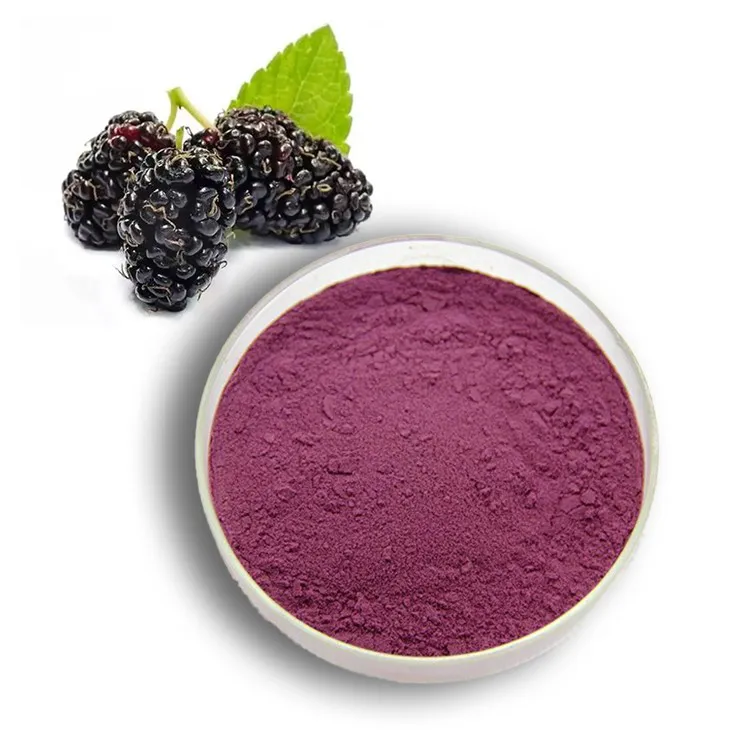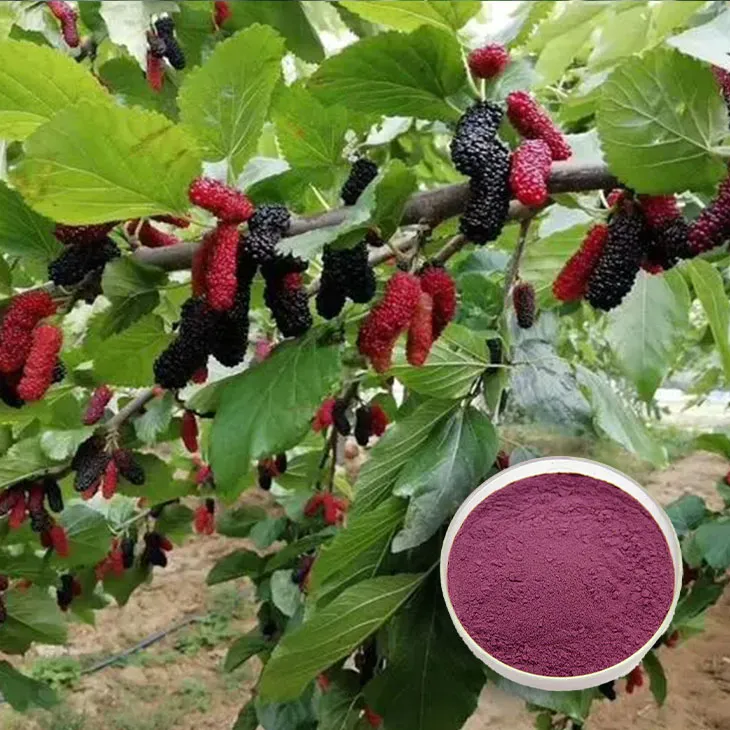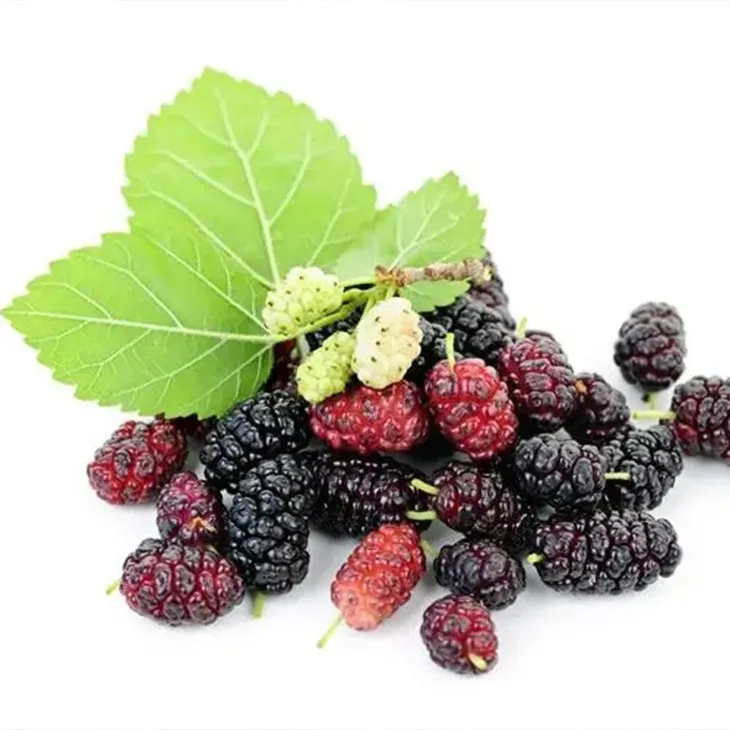- 0086-571-85302990
- sales@greenskybio.com
The Best Herb for Treating Anxiety and Insomnia: Mulberry Extract
2024-11-14

1. Introduction
Anxiety and insomnia are two prevalent health concerns that can significantly impact an individual's quality of life. In modern society, the fast - paced lifestyle, high stress levels, and various environmental factors contribute to the increasing incidence of these problems. While there are numerous treatment options available, including pharmaceutical drugs and various relaxation techniques, there has been a growing interest in natural remedies. Among these, Mulberry Extract has emerged as a promising candidate for treating anxiety and insomnia.

2. Chemical Composition of Mulberry Extract
Mulberry Extract is rich in various bioactive compounds, which are believed to be responsible for its potential therapeutic effects on anxiety and insomnia. Two important classes of these compounds are flavonoids and phenolic acids.
2.1 Flavonoids
Flavonoids are a large group of polyphenolic compounds that are widely distributed in plants. In mulberry, flavonoids such as rutin, Quercetin, and kaempferol are present. These flavonoids have been shown to possess antioxidant, anti - inflammatory, and neuroprotective properties. Antioxidant properties help in reducing oxidative stress in the body, which is often associated with anxiety and sleep disorders. Neuroprotective effects can protect neurons from damage and improve the function of the nervous system, potentially leading to a reduction in anxiety levels and an improvement in sleep quality.
2.2 Phenolic Acids
Phenolic acids in mulberry extract, such as caffeic acid and chlorogenic acid, also contribute to its beneficial effects. These acids have been reported to have anti - stress and calming effects on the body. They can modulate the activity of neurotransmitters in the brain, which play a crucial role in regulating mood and sleep. For example, they may affect the levels of serotonin, a neurotransmitter that is closely related to feelings of well - being, relaxation, and sleep regulation.

3. Studies on the Efficacy of Mulberry Extract in Treating Anxiety
Several studies have been conducted to investigate the effectiveness of mulberry extract in reducing anxiety levels.
3.1 Animal Studies
In animal models, mulberry extract has shown promising results. For instance, in a study on rats exposed to chronic stress, those treated with mulberry extract exhibited reduced anxiety - like behaviors compared to the control group. This was measured using behavioral tests such as the open - field test and the elevated plus - maze test. The rats treated with mulberry extract showed increased exploration in the open - field test and less hesitation in the elevated plus - maze test, indicating a reduction in anxiety levels. These results suggest that the bioactive compounds in mulberry extract may interact with the brain's stress - response systems and modulate the release of stress hormones, thereby alleviating anxiety.
3.2 Human Studies
Although human studies on mulberry extract for anxiety are relatively limited, some preliminary findings are encouraging. In a small - scale clinical trial, participants who took mulberry extract supplements for a certain period reported a decrease in self - rated anxiety levels. They also showed improvements in physiological markers associated with anxiety, such as heart rate variability. However, more large - scale, well - controlled human studies are needed to further confirm these findings and to determine the optimal dosage and treatment duration.

4. Studies on the Efficacy of Mulberry Extract in Treating Insomnia
The potential of mulberry extract in improving sleep quality has also been explored in various studies.
4.1 Mechanisms of Action on Sleep
Mulberry extract may affect sleep through multiple mechanisms. One possible way is by modulating the levels of neurotransmitters involved in sleep regulation, such as gamma - aminobutyric acid (GABA). GABA is an inhibitory neurotransmitter that promotes relaxation and sleep. The bioactive compounds in mulberry extract may enhance the activity of GABA receptors, leading to a calming effect and facilitating sleep onset. Additionally, mulberry extract's antioxidant and anti - inflammatory properties may also contribute to improving sleep by reducing oxidative stress and inflammation in the body, which can disrupt sleep patterns.
4.2 Sleep - related Studies
In a study on individuals with mild insomnia, those who consumed mulberry extract showed an improvement in sleep parameters. They reported shorter sleep latency (the time it takes to fall asleep), increased total sleep time, and improved sleep efficiency (the ratio of actual sleep time to total time in bed). These improvements in sleep quality were associated with the consumption of mulberry extract, suggesting its potential as a natural sleep aid. However, as with the studies on anxiety, more comprehensive research is required to fully understand its effects on different types of insomnia and to establish its long - term safety and efficacy.
5. Comparison with Other Herbal Remedies
There are several other well - known herbal remedies for anxiety and insomnia, and it is important to compare mulberry extract with them to understand its unique advantages.
5.1 Valerian
Valerian is a popular herbal remedy for insomnia. It has been used for centuries to promote sleep. However, valerian has a strong odor and taste, which can be unappealing to some users. In contrast, mulberry extract has a relatively mild taste and odor. Additionally, while both valerian and mulberry extract may affect neurotransmitter levels related to sleep, their mechanisms of action may be different. Mulberry extract's broader range of bioactive compounds may offer additional benefits in terms of anxiety reduction, which valerian may not provide to the same extent.
5.2 Chamomile
Chamomile is another commonly used herb for its calming effects. It is often consumed as a tea. Chamomile contains flavonoids and other compounds that contribute to its relaxing properties. However, the concentration of bioactive compounds in chamomile may be lower compared to mulberry extract. Mulberry extract's higher content of flavonoids and phenolic acids may potentially make it more effective in treating anxiety and insomnia. Moreover, mulberry extract can be formulated into different products, such as capsules or tinctures, which may offer more convenient options for some users compared to chamomile tea.
5.3 Passionflower
Passionflower is known for its anxiolytic properties. It can reduce anxiety levels by interacting with the central nervous system. However, like valerian, passionflower may have some side effects in certain individuals, such as drowsiness or dizziness. Mulberry extract, on the other hand, has shown relatively few side effects in the studies conducted so far. This makes it a potentially safer option for those who are concerned about adverse reactions while treating anxiety and insomnia.
6. Comparison with Traditional Medications
Traditional medications for anxiety and insomnia, such as benzodiazepines and selective serotonin reuptake inhibitors (SSRIs), are widely used but also have some limitations.
6.1 Benzodiazepines
Benzodiazepines are effective in treating anxiety and insomnia in the short - term. However, they can cause side effects such as drowsiness, dependence, and withdrawal symptoms. Mulberry extract, as a natural alternative, does not seem to have the same level of dependence - forming potential. While it may not provide immediate relief as quickly as benzodiazepines, its long - term use may be associated with fewer risks. Moreover, benzodiazepines often require a prescription, while mulberry extract can be obtained as a dietary supplement in many cases.
6.2 SSRIs
SSRIs are commonly used for treating anxiety disorders. They work by increasing the levels of serotonin in the brain. Although they are effective for many patients, they also have side effects such as nausea, sexual dysfunction, and weight gain. In comparison, mulberry extract, with its natural modulation of neurotransmitter levels and its antioxidant and anti - inflammatory properties, may offer a more holistic approach to treating anxiety without some of the common side effects associated with SSRIs. However, it should be noted that mulberry extract is not a substitute for medical treatment in severe cases of anxiety or insomnia, and patients should always consult their healthcare providers before making any changes to their treatment regimens.
7. Conclusion
In conclusion, mulberry extract shows great potential as a natural remedy for treating anxiety and insomnia. Its chemical composition, including flavonoids and phenolic acids, provides a basis for its possible therapeutic effects. Studies on both animals and humans have indicated its efficacy in reducing anxiety levels and improving sleep quality. When compared with other herbal remedies and traditional medications, it has unique advantages such as a relatively mild taste and odor, fewer side effects, and a potentially broader range of benefits. However, more research is still needed to fully understand its mechanisms of action, optimize its dosage and treatment duration, and establish its long - term safety and efficacy. As the demand for natural and holistic approaches to health continues to grow, mulberry extract may become an increasingly important option for those seeking relief from anxiety and insomnia.
FAQ:
What are the main components in mulberry extract that may help with anxiety and insomnia?
Flavonoids and phenolic acids are the main components in mulberry extract that may have a calming effect on the nervous system, which in turn could help with anxiety and insomnia.
How does mulberry extract compare to traditional medications for treating anxiety and insomnia?
Mulberry extract has unique advantages compared to traditional medications. It is a natural remedy, which may have fewer side effects. While traditional medications often target specific receptors or neurotransmitters in a more direct but sometimes more invasive way, mulberry extract may work through its natural chemical composition to soothe the nervous system in a more holistic manner. However, more research is still needed to fully understand the extent of these differences in effectiveness.
Are there any side effects of using mulberry extract for anxiety and insomnia?
Currently, there is no widespread evidence indicating significant side effects of using mulberry extract for anxiety and insomnia. Since it is a natural product, it is generally considered safer than some synthetic medications. However, individual sensitivities can vary, and some people may experience mild digestive discomfort or allergic reactions, although these are relatively rare.
How much mulberry extract should be taken to treat anxiety and insomnia?
The appropriate dosage of mulberry extract for treating anxiety and insomnia has not been firmly established. Dosage may depend on various factors such as the concentration of active ingredients in the extract, the individual's age, weight, and overall health condition. It is advisable to consult a healthcare professional before starting any supplementation regimen.
Can mulberry extract completely cure anxiety and insomnia?
Mulberry extract may help in reducing anxiety levels and improving sleep quality, but it is unlikely to completely cure anxiety and insomnia on its own. These conditions are often complex and can be caused by multiple factors such as stress, lifestyle, and underlying medical conditions. Mulberry extract can be part of a comprehensive approach that may also include lifestyle changes, psychological counseling, and other appropriate treatments.
Related literature
- The Efficacy of Mulberry Extract in Nervous System Disorders"
- "Flavonoids in Mulberry: Their Role in Anxiety and Sleep"
- "Mulberry Extract vs. Other Herbal Remedies for Anxiety - Related Sleep Problems"
- ▶ Hesperidin
- ▶ citrus bioflavonoids
- ▶ plant extract
- ▶ lycopene
- ▶ Diosmin
- ▶ Grape seed extract
- ▶ Sea buckthorn Juice Powder
- ▶ Beetroot powder
- ▶ Hops Extract
- ▶ Artichoke Extract
- ▶ Reishi mushroom extract
- ▶ Astaxanthin
- ▶ Green Tea Extract
- ▶ Curcumin Extract
- ▶ Horse Chestnut Extract
- ▶ Other Problems
- ▶ Boswellia Serrata Extract
- ▶ Resveratrol Extract
- ▶ Marigold Extract
- ▶ Grape Leaf Extract
- ▶ blog3
- ▶ blog4
- ▶ blog5
-
Organic Tongkat Ali extract powder factory.
2024-11-14
-
How to make powder with ashwagandha extract.
2024-11-14
-
Rosehip extract manufacturers from China.
2024-11-14
-
The best cat's claw extract in nature.
2024-11-14
-
Chinese Dandelion Leaf Extract Suppliers.
2024-11-14
-
Ivy Extract
2024-11-14
-
Lavender Extract
2024-11-14
-
Tormentil Extract
2024-11-14
-
Horse Chestnut Extract
2024-11-14
-
Boswellia Serrata Extract
2024-11-14
-
Sea buckthorn Juice Powder
2024-11-14
-
Lemon Extract
2024-11-14
-
Alisma Extract
2024-11-14
-
Aguaje Extract
2024-11-14
-
Saw Palmetto Extract
2024-11-14





















